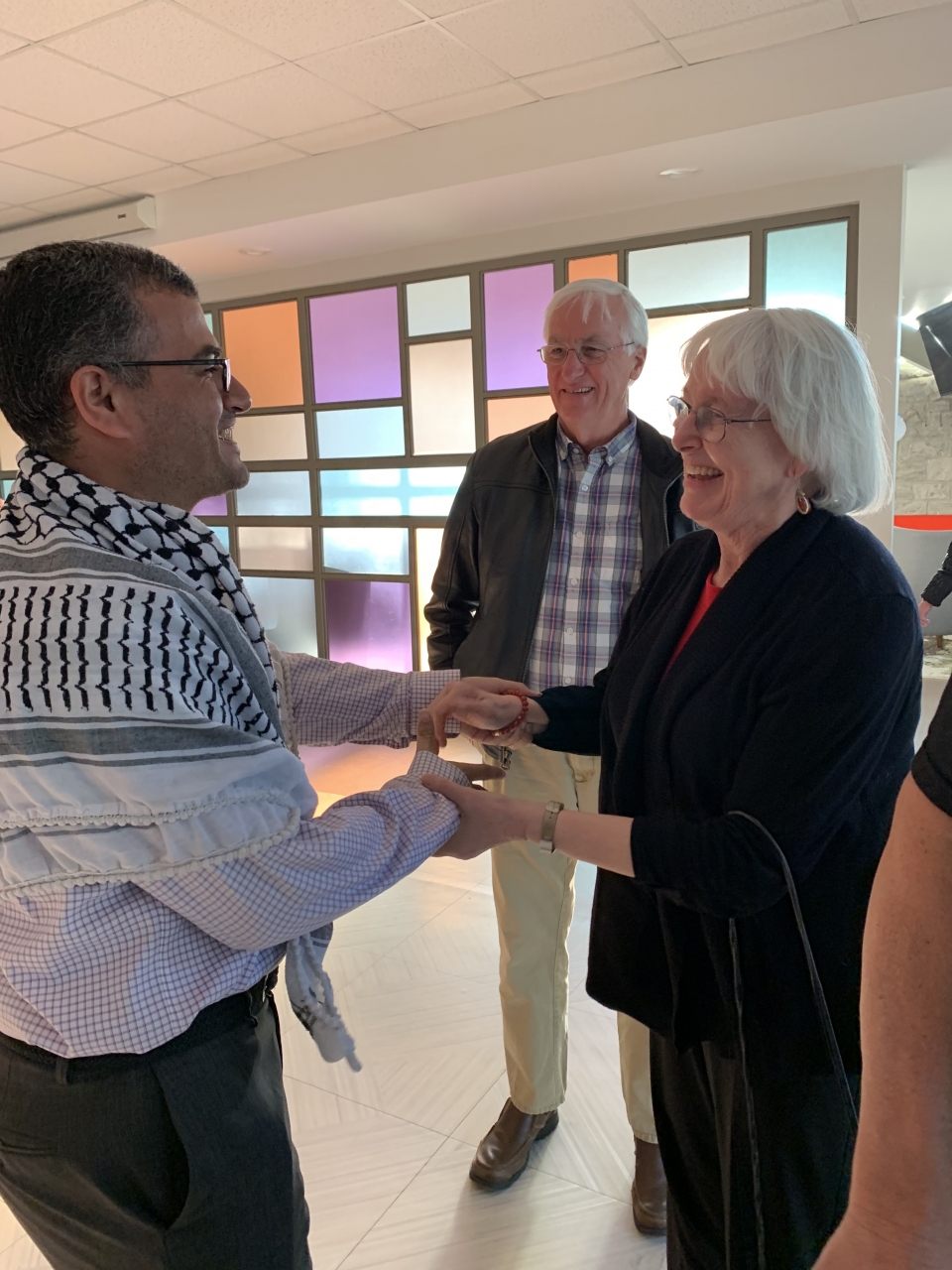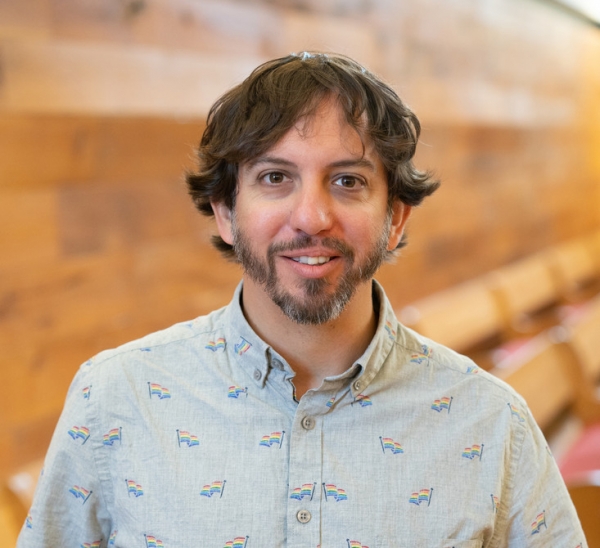
Since 1948, AFSC has worked with Palestinians, Israelis, and the international community to realize a just and lasting peace in Palestine and Israel. Thank you for being part of our efforts!
Over the past year, we’ve seen signs of progress in our collective work to change government policies and corporate practices that support inequality, the Israeli occupation, and denial of refugees’ rights.
As 2019 draws to a close, we look at highlights from the past year and how we can continue to work together in the year ahead.
Bringing Gaza to the U.S.
“In my trip [through the United States], I’ve felt and have been embraced by a great deal of love. I saw and met many wonderful people that are in solidarity with Palestinians and that feel like Palestine lives in their hearts. This has rejuvenated my spirit.”

Those were the reflections of Ahmed Abu Artema—the visionary Palestinian writer from Gaza—who was featured in an AFSC-sponsored nationwide speaking tour this year. In 12 cities across the U.S., Ahmed shared his story of growing up in Rafah, separated from part of his family by the blockade and fence surrounding Gaza—dreaming of a life with the freedom to travel and return to his parents’ historic home in a future where Palestinians and Israelis live as equals.
Ahmed’s writings helped inspire the nonviolent protest the Great March of Return, which started in 2018. During our tour, he spoke with people in coffee shops and university lecture halls, in living rooms and congressional briefing rooms, in churches, synagogues, and mosques. He survived a Chicago “polar vortex” and walked the beach near the U.S. border fence with Mexico. He shared meals with Native Americans in New Mexico and Palestinian Americans in New York. He spoke on radio programs in Chicago; Madison, Wisconsin; Santa Fe; and San Francisco, and appeared on nationally televised “Democracy Now!”
During the tour, we also launched a fundraising campaign to provide seniors in Gaza with medicine, hygiene items, and other products to help them maintain their dignity. Thanks to AFSC supporters, we raised more than $30,000 to help people in Gaza meet their basic needs today as we continue to push for political change to end the blockade and the occupation.

In 2020, we will bring a new speaking tour to the U.S., and we’re excited to share more information with you soon.
Over the past year, we also:
- organized public actions with partners in Chicago to highlight the impact of the blockade (including a Chicago river flotilla and protest at Boeing).
- met with members of Congress about restoring funding to UNRWA and addressing the political and humanitarian needs of Palestinians in Gaza.
- provided resources about Gaza to students and other advocates through conferences, trainings, and other events.
- published a booklet of essays written by young people in Gaza, “My Life Under Blockade,” which serves as a resource for congregations and other groups interested in integrating Gaza into discussion and reading groups.
Our efforts are leading the way to shift the discourse on Gaza, especially as we are entering 2020, the year in which the United Nations said Gaza will be uninhabitable.
Standing up for Palestinian children’s rights
Our No Way to Treat a Child campaign—a partnership with Defense for Children International-Palestine—calls on the U.S. government to use all available means to pressure Israeli authorities to end the detention and abuse of Palestinian children. First and foremost, that means prohibiting U.S. taxpayer money from funding the military detention of children by any country, including Israel.

And our efforts are making a difference. On April 30, U.S. Rep. Betty McCollum introduced “Promoting Human Rights of Palestinian Children Living under Military Occupation H.R. 2407,", a key step in demanding accountability for U.S. military aid to Israel. It now has 23 co-sponsors.
We have continued to work with faith communities, partner organizations, and individuals across the U.S. to engage members of Congress through briefings on Capitol Hill; legislative visits; and emails, petitions, and phone calls from constituents. We offer trainings and webinars, organize speaking tours, and advise faith-based communities and others on ways to make their voices heard.

In September, dozens of activists joined us in Washington, D.C. for a gathering to sharpen our advocacy skills, and in November, we held a congressional briefing on Capitol Hill with Christian leaders and Rep. McCollum to demonstrate the growing call for policies that protect the humanity and dignity for all. (If you wish to add your name to the letter from Christian leaders, follow this link).
Promoting economic activism
We continued to support efforts to push for rights and justice in Palestine and Israel through support for Boycott, Divestment, and Sanctions campaigns. As Congress and state legislatures try silence BDS activists through measures that violate First Amendment rights, AFSC joined two amicus briefs to support legal challenges to anti-BDS laws in Arkansas and Arizona. We also supported the Lutheran, Unitarian, and Episcopal Church as they sought to implement human rights investment screens related to Palestine and Israel, and we assisted student-led campaigns on college campuses around the country.
In 2019, we also relaunched AFSC’s Investigate website, which helps people screen their investments for companies that are involved in military occupation, mass incarceration, immigrant detention and surveillance, and the border industry. The site now includes a tool that allows individuals to identify companies complicit in human rights abuses that may be present in their mutual funds. Thousands of mutual funds are rated as green, yellow, or red, allowing investors to switch to an occupation-free alternative. We added 35 new company profiles to our database of 200 companies, 13 new industry profiles, and a new quarterly newsletter.
As we look forward to the coming year, we plan to continue to support BDS efforts and will continue to build linkages across movements to push forward change.
Unfortunately, U.S. policy has brought several significant moves backwards in the struggle for peace and justice in Palestine and Israel over the past year. The U.S. government:
- recognized Israeli control over the occupied Syrian Golan heights,
- ended its opposition to Israeli settlements, and
- weaponized accusations of anti-Semitism to silence criticism of Israeli policies.
AFSC has worked to oppose these dangerous policies—and we thank you for standing with us.
Despite these challenges, like Ahmed, our spirits were rejuvenated this year by the opportunity to meet and work with so many passionate people committed to a better world for all. We have more exciting work planned for 2020, and we’re looking forward to continued engaged activism in the New Year!




